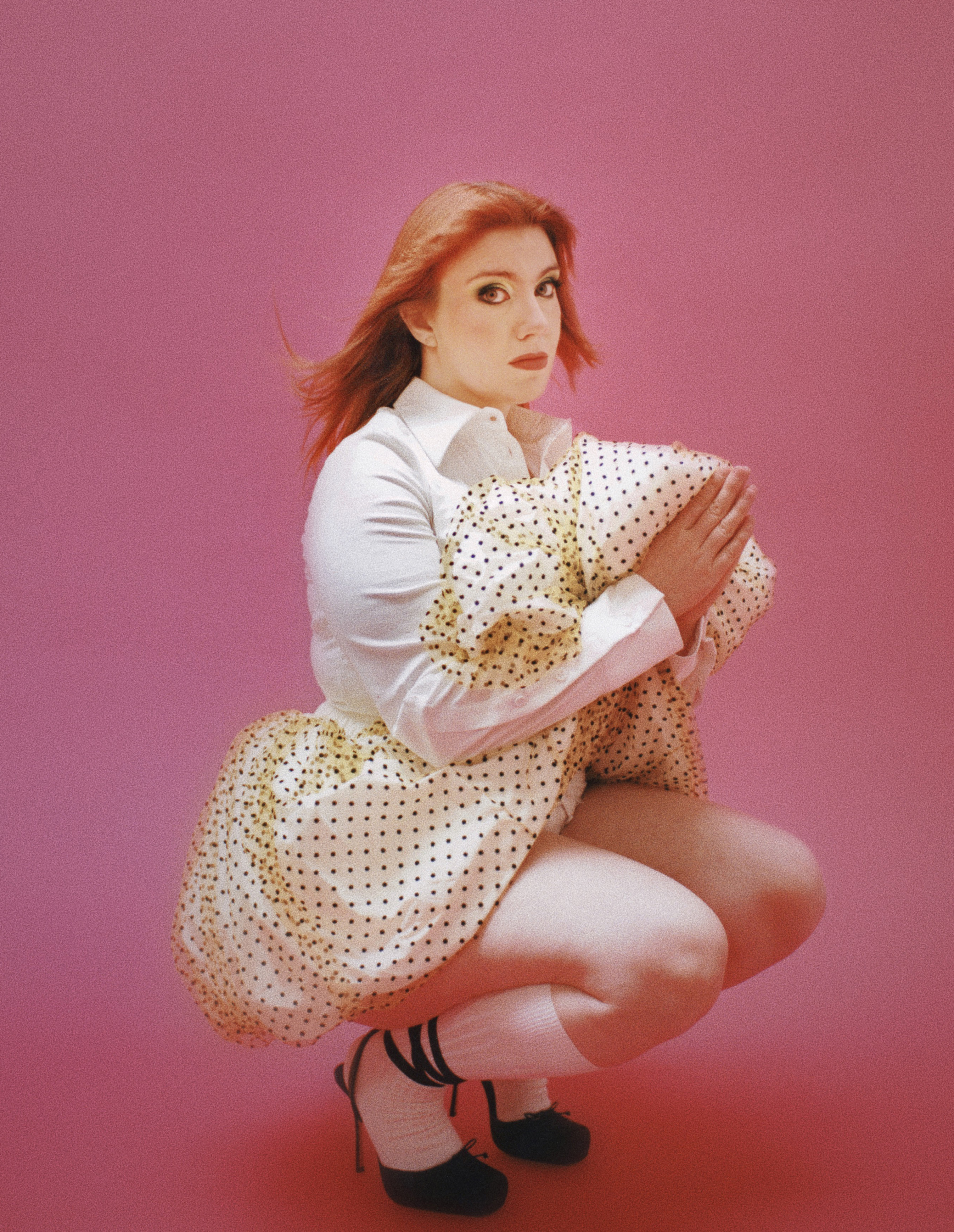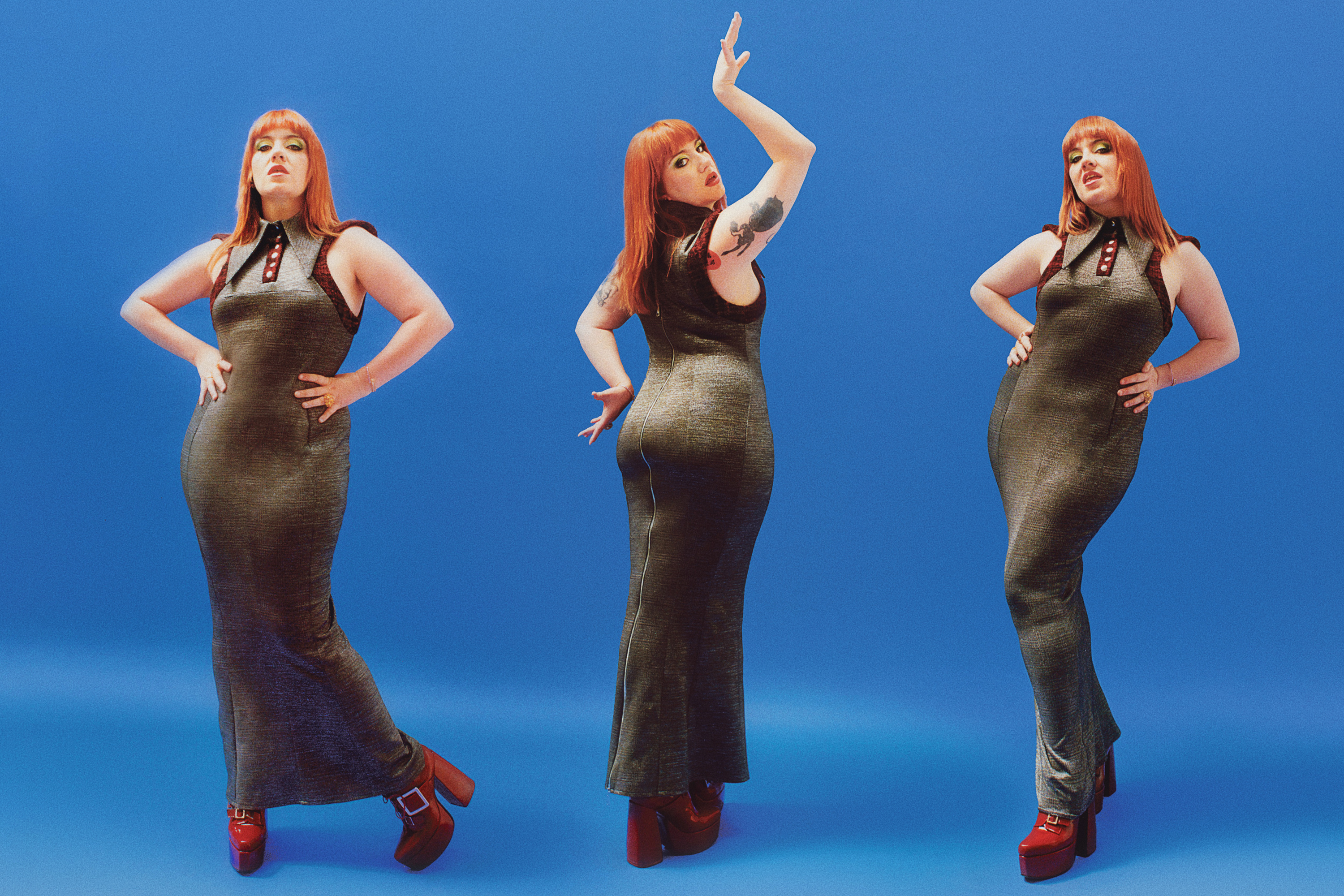A month or so ago, the singer-songwriter CMAT had an experience that filled her with rage. A “famous person who is very skinny and beautiful” – whom she declines to name, but admits will not be hard to identify – shared a “body positive” inspiration post on Instagram.
“It was like, ‘If you want to fill your timelines with women who aren’t harming themselves in the name of patriarchal beauty standards, you should follow all these women,’” she says. “And then she just … listed fat women. Not even fat women – size 14 or 16 women. I was kind of incensed by this.”
The list included herself, the writer-director Lena Dunham and the actor Megan Stalter, seemingly bundled together because of how much they weighed.
“And, this is the other thing,” CMAT says with a cackle, a gem glinting on one tooth. “She doesn’t even follow me!”
It was the sort of disorienting, disturbingly funny experience that CMAT might skewer in a song: a merging of pseudo-feminism and sly fatphobia beamed from what she thinks may be the biggest problem of all: “the phone”. And though CMAT – Ciara Mary-Alice Thompson – tells me this story in an empty boardroom in Sony Music’s London office, her narration has all the comic flourishes and camp exaggerations as her stage performances.
This kind of storytelling is Thompson’s great power as an artist, picking at her own experiences and letting us know how raw they feel. We are speaking at a moment of anticipation for the 29-year-old Irish musician in the wake of her electrifying Glastonbury set, about which the Guardian’s Alexis Petridis wrote that “it really doesn’t seem inconceivable that she could be headlining the next time she returns”. Her new, third album, Euro-Country, features a series of singles that have racked up streaming numbers in the multimillions and prompted widespread discussion.
One of those tracks, Take a Sexy Picture of Me, was written about the abuse she received online in relation to her weight after appearing last year at Radio 1’s Big Weekend. The song uncomfortably charts the years Thompson spent trying to look good for men; waxing legs with tape at age nine, being seen as past her expiry date when she turned 27. Thompson performed the song at Glastonbury, where a crowd of 60,000 sang along and performed the “woke Macarena” dance routine that accompanied the song in a viral TikTok trend.

CMAT wears fitted poplin shirt leotard by Sinéad O'Dwyer, bubble skirt by Keburia and Cassia lace-up pumps by Christian Louboutin
“I would never pretend to be from a council flat like the English pop stars do, but we didn’t have spare cash, let’s say that. Witnessing the economic crash was really terrible”
“I would never pretend to be from a council flat like the English pop stars do, but we didn’t have spare cash, let’s say that. Witnessing the economic crash was really terrible”
For nine months before she played the Pyramid stage at Glastonbury, Thompson was scared. She started rehearsing for her set last November, hiring an extra violin player and thinking about what production would help her band (which she calls the Very Sexy CMAT band) sparkle during a daytime performance. The Pyramid was the stage she’d demanded of the festival’s chief, Emily Eavis, but as June drew nearer, the gravity of what she had insisted on began to sink in. “I was like, ‘Oh fuck. I’ve girlbossed too close to the sun.’”
Thompson woke up the day before her performance wanting to vomit. Her mother, Sinéad, turned up with a pyramid necklace and kept asking if she was nervous. Thompson decided to be alone. That night, she managed about two hours’ sleep, looking at her phone and screaming whenever she saw how little time was left. “My boyfriend was working in a chip van at Glastonbury, so I slept behind a chip van the night before the Pyramid stage,” she says. “There was a fridge going off by my head the whole time.”
However sleep-deprived she was, Thompson delivered one of the most assured, joyful and talked-about sets of the summer, marking a tipping point in her career. “It was the scariest thing I’ve ever done,” she says. “I can’t wait to do it again.”
The musician grew up in Dunboyne, a commuter town north-west of Dublin, and credits her difficult teenage years with giving her material to write about. “I think that my job as a songwriter has always been to pick apart stuff that I think is wrong or needs improving,” she says. “I don’t really feel like I could have been the songwriter that I became had I not gone through so much when I was younger.”
When I ask what exactly, she says she doesn’t want to get into specifics. “I didn’t have an easy family life. I would never pretend to be from a council flat like the English pop stars do, but we didn’t have spare cash, let’s say that. Witnessing the economic crash was really terrible.”
Thompson struggled with “what we now would refer to as an eating disorder” and dropped out of Trinity College Dublin because she was so unwell. A few years, later at 22, having moved from Ireland to Manchester, she sat in front of a mirror and wrote her breakthrough song, I Wanna Be a Cowboy, Baby!, a wide-open western tune in which her smooth, timeworn voice sounds like it’s drifting out of an old radio as she sings: “And I feel bad, ’cause I didn’t cry / When someone I grew up with died / But I break down every time I’m on the scales.”
With its yearning for freedom and adventure and its deep well of sadness, the track perhaps unsurprisingly became a hit when released during the pandemic, quickly supercharging Thompson’s fanbase.
Her debut 2022 album, If My Wife New I’d Be Dead, reached No 1 in Ireland and won the RTÉ Choice music prize for Irish album of the year. She followed it up in 2023 with Crazymad, for Me, which won her nominations for a Brit award and an Ivor Novello, as well as the Mercury prize. As with her debut – which has a song about the late Hollywood auteur Peter Bogdanovich – she littered the follow-up with inside jokes. One song concerns the footballer Vincent Kompany. Another, Such a Miranda, is about the Sex and the City character.

‘She’s so real for that’: CMAT performs at All Points East festival in London last weekend (Redferns)
But the main focus of her second album was a formative breakup, a subject that Thompson explored in a process she likens to being an investigator, or digging the ground. “The main headline in terms of suffering in my life was the first relationship I was ever in. I was in a relationship with a much older guy for, like, five and a half years, [from being] still in school until I was 23,” she pauses. “And he was a terrible bastard.”
When Thompson performed the album’s biggest single, Stay for Something, at Glastonbury this year, she vaulted the metal barrier and parted the crowd like the Red Sea. Adrift in the throng, she sang the bridge over and over: “And they tell me I should hate you / Say, you put me through it / Lord, I know I used to / But I just can’t do it.”
When I watched footage of the performance on YouTube, at first I thought it looked like the ultimate revenge fantasy: an endless crowd jumping up and down on the memory of a deadbeat ex. But then I noticed the final line is the one the crowd are really singing along to: “But I just can’t do it.” The real takeaway is that, despite what he did to her, she still can’t find it in herself to hate him. This willingness to wrestle with the uncomfortable parts of ourselves is what gives Thompson’s music such emotional honesty. Or as her fans might succinctly put it: she’s so real for that.
As making music is how she metabolises these experiences, Thompson says she felt able – mostly – to leave behind thoughts of how much she weighed in her 20s. The media industry, however, hasn’t let her forget about it, with fashion magazine stylists tutting that she doesn’t fit into sample sizes, despite being sent her exact measurements. “I don’t think I’m asking for anything that unusual and yet people seem to be either annoyed by the way I look or over-champion me and call me brave and amazing for literally just having a body,” she says.
The really knotty part of all this, though, is that whatever happens with her body now, she feels as if she will lose in some way or another. “One day I might lose weight. It hasn’t fucking happened yet because, Lord knows, I’ve tried to be skinnier than I am. But one day I fucking might and those bastards will be happy, and people who are bigger will be disappointed in me,” she says. “I think that’s what feels kind of grim about it. I don’t really want any of this on me because I should be liable to do whatever I want with my physical appearance.”
Thompson relies on a wide range of retro instruments, including the electronic harp-like omnichord, organ, lap steel guitar and the Wurlitzer electronic piano. On Euro-Country, the song Running/Planning was inspired by the freak folk of 70s artists such as Pentangle, but also the warm, organic sound of Little Simz. Using an old Mellotron keyboard to blend recordings of French accordion and mandolin from the 1950s, as well as a ringing, folksy 12-string guitar, the song has a European country music feel that is distorted by layers of synths. The result is music that is familiar but a little strange, never leaning too far back into pure nostalgia.
Euro-Country, Thompson says, is her attempt to make a really personal album. It ended up also being a political one. Take Janis Joplining, a rousing ballad recalling the experience of having a crush on a married person. She says the song is really about being jealous of the kind of intimacy he has with his wife; an intimacy that’s hard to find at this overly connected yet disconnected moment in history.

CMAT wears organza cropped trench, shirt, feather tie by S.S.Daley and pearl earrings by Completedworks
“Those big American stars who haven’t said a peep [about Gaza] – I don’t know how they’re doing it”
“Those big American stars who haven’t said a peep [about Gaza] – I don’t know how they’re doing it”
Lord, Let That Tesla Crash was written for a close friend who died while the album was being made. In the song, Thompson recalls visiting his house before his funeral to find a Tesla parked outside – Elon Musk’s presence intruding on the scene – and how the anger it made her feel was all she had to show for the experience.
A few weeks before we meet, Thompson released a snippet of the album’s title track, Euro-Country, that went viral in Ireland. The song takes aim at the former taoiseach Bertie Ahern, who led Ireland through the economic boom of the Celtic tiger, and the subsequent financial crash of 2008. The lyrics reference the dramatic spike in – predominantly male – suicides in Ireland at the height of the crash: “All the big boys, all the Berties / All the envelopes, yeah, they hurt me / I was 12 when the das started killing themselves all around me.”
It is the song that perhaps best captures the album’s blend of the personal and the political, with its title partly lamenting a country that has become consumed by capitalism. After she released a snippet of the track featuring these lines, she went back to Ireland for her sister’s baby’s first birthday party. “There was a fucking taco truck at the front [that they’d hired]. I was like: ‘OK, the boom is back, diva,’” she says.
Thompson tells me that, after a snippet of the song went viral, she was sitting in her sister’s kitchen with her mother, her mother’s friend and two aunts huddled around mugs of tea, hearing them recount all the suicides in Dunboyne after the crash. Out of respect for the families, she asks me not to print the details of how each man died, but they are so horrifying in their specificity that I think about them for days afterwards.
“I was like, maybe I’m exaggerating to myself how bad it was?” she says. “Then them all sitting at the table chatting about the very explicit and very gruesome details of how these men killed themselves in a very public way – it blew my fucking mind.”
She doesn’t recall the deaths being properly spoken about in public at the time, but when she posted the song, the comments underneath were filled with young people recalling terrible stories from the period and comforting one another. “That’s one of the most profound things to have happened to me so far in my career,” she says.
Given the level of abuse faced by musicians who speak out about what humanitarian experts have described as a genocide in Palestine, I wondered whether Thompson might choose her words carefully. But it quickly becomes clear that not only will she speak freely about almost everything, but she also has what seems like a bottomless level of disgust for those not using their platform to speak out.
“The musicians who haven’t said anything are of no interest to me. I’m not gonna name names because I don’t wanna get death threats from any fucking fan clubs. But you know who I’m talking about. Those big American pop stars who haven’t said a fucking peep – I don’t know how they’re doing it,” she says, and as she continues talking, it’s as though she is gathering energy like a storm. “Are you scared of, like, not making money any more? Because you’re gonna make money. Maybe not as much. Maybe not hundreds of millions – just tens of millions. Sad.”
Thompson is part of a wave of Irish artists speaking out in support of Palestine, including musicians such as Fontaines DC, Kneecap and Lankum, and writers including Sally Rooney, who earlier this month pledged to use royalties from the BBC adaptations of her novels to support Palestine Action. I spend a lot of time in Dublin with my boyfriend’s family, and whenever I’m there, I can see from the prominence of the graffiti and posters all over the city how much vocal support for Palestine there is.
When I ask why there is so much solidarity among young Irish people, Thompson says that learning Irish history at an early age instils in them a deep understanding about colonialism and oppression. “The public education of Ireland is teaching children from a very young age that we do not like the empire,” she says. “We do not like colonialism.”
This feeling, she says, goes back generations. To this day her grandmother still remembers the Irish bands and musicians who played in Apartheid-era South Africa during the 60s and 70s. “They pop up on The Late Late Show and she’s like: ‘Fuck them’. She has a clinical memory for people who crossed that picket, and I think that this generation will have the exact same memory for people who didn’t fucking say anything or do anything.”
These days, Thompson lives in London but has mixed feelings about the UK as a whole. “I remember living in England for the platty joobs [the queen’s platinum jubilee in 2022] and everyone was loving it. And I was like: ‘This is mad. You guys are crazy,’” she says. “There’s so much good stuff about England, but none of it is to do with Great Britain and none of it is to do with the empire.”
After listening to her for an hour or so, I start to see that Thompson’s willingness to talk about it all is not so different from the way she throws everything on the table in her songwriting. But it also made me wonder where she will go next. She says she’s now very happy in a relationship and yet so much of her songwriting seems to come from frustration and sadness. Does she worry that contentment may get in the way of her music?
“I actually think I am quite a happy person, and quite a joyous person and,” she pauses like a circus ringmaster, “I’m quite a lover. But I don’t feel like love and happiness are worth picking apart, because they’re very precious. I think you have to just let it happen and hope for the best.”
Euro-Country is out via CMATBaby and Awal
Photographs by Katie Burdon for The Observer. Styling by Sam Deaman, Hair & Makeup: Niall Candy using Pat McGrath and MAC cosmetics; green metallic jersey polo dress by Maximilian Raynor, shoes by Roker, bangle and rings by SWAROVSKI
Newsletters
Choose the newsletters you want to receive
View more
For information about how The Observer protects your data, read our Privacy Policy

